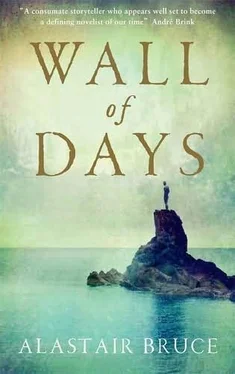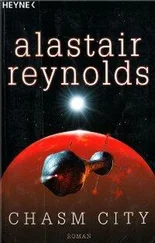Alastair Bruce
WALL OF DAYS
For Tabatha and Sophia, with love
It has been raining here for ten years. I keep an accurate record of time and can state this with no fear of contradiction. There have been whole days when it hasn’t rained and most days it stops for a few hours. But these are pauses in a relentless fall that promises to one day submerge this island. It is already saturated in places. The marshes have doubled in size since I arrived and the cliffs to the north are falling into the bay, their mud walls no match for the rain. It is a place, this island, that is neither water nor land, an in-between world, a world in transition. When I walk through the grasslands and the marshes to the peat fields in the south I can feel the ground give way beneath my feet as if it were afloat. Sooner or later all that will be left will be the rocky hill on which I have made my home. The cave in the hill is the only place on the island that remains dry, and it is warm. I keep a fire lit and have fashioned a door, using the raft that brought me to this island.
The rain is sometimes so light it is like mist. I can see the mist creeping into the cave from below the door. It rolls in off the ocean and settles over the marshes. It swirls, eddies, faces begin to form.
At the end of each day I make a small mark with a stone on the wall of the cave. The seventh line I draw crosses the previous six. At the end of fifty-two of these plus one extra mark or two extra every fourth year I start a new row. Last night I reached the end of the tenth. Tonight I will start another. Every year with the last of the marks I remember being told why we measure time in this way – with one or two extra days in a year – but every year I realise I have forgotten the reason. I imagine it is something to do with the moon, the moon I have not seen for a decade. So much of what I do, of what we used to do, is for reasons that I cannot remember, that I dare say no one can remember.
Marks on a wall. The second time in my life I have made marks on a wall. They mean more than days. I do not forget that.
There is wood on the island. In the east is a small forest. It is a dark place. Or, darker. The light does not seem to penetrate to the floor, even though the growth is sparse. For some reason the forest has not spread. I have seen no saplings, only mature trees. I allow myself to cut down one every eight weeks. That and the peat I dig out are my sources of fuel.
I have fixed on this period of eight weeks for a simple reason. My calculations prove I have at most twenty years left on this island and at last count there were one hundred and thirty-three trees. That is approximately one every eight weeks. I have been following this practice since the seventeenth week of my arrival. In the beginning I was profligate and cut down more than I should have, before realising that none grew to take their place.
I began in the centre of the trees, in the darkest part of the small forest, and am slowly working my way out.
The peat bogs are located a mile from my cave in the direction of the forest. These too I have measured. These too I have made sure will last twenty years.
The cave, the cliffs, forest, marshlands, peat bogs – islands in a sea of wet grass. Islands within an island. One day I drew a map of the island on the wall of the cave, opposite the wall of days. The cave I marked with an X. This is my world.
I don’t know if I will need twenty years. I am no longer young. In twenty years I will be seventy-three. Very few live to that age. I might well go sooner.
The island is a silent place. There is only the rain, the soft wind.
When I walk through the grasslands, my hands, hanging at my sides, wipe moisture from the blades. I hear the noise of my feet in the mud and the low singing of the grass in the breeze. There are seagulls too, fewer now than in the beginning. Every now and then I find one lying in a puddle. If I find them before the worms they are usually edible. I wash them in seawater, cut off their heads, scrape out the innards. If I wrap the carcass in clay and bake it in the fire, the feathers come off with the hardened clay.
Walking through mud is hard work. It sucks you down, grasping at your ankles. Only by moving do you feel you can escape. It is mostly an illusion. The bog is treacherous if you don’t know what you’re doing. Some pools are deceptively deep and filled with thick mud. But I know where they are. If you didn’t, and if you were weak, you could find yourself slipping into the marsh, gripped by exhaustion and cold, swallowing mouthful after mouthful of mud.
I could have built paths around the island if I had enough wood or enough stones. A path from my cave to the peat bogs, another to the forest. One to my fishing grounds, and to the northern cliffs, one circling the island. So many things I could have built. But I would need more than the island has to offer and perhaps a helper too.
I no longer talk to myself. When I first arrived it was my only way of remaining sane. Now, the sound of my voice would feel alien in the silence. If I were to talk there would be nothing to hear me, nothing save the wind, the rain, the sea. It is not a world for speech. There is no helper. I have not believed that to be a bad thing.
I do not talk also because I would imagine replies. A voice from behind a rock, behind a tree, from the top of the cliff. The speaker hidden, daring me to find him, waiting for me.
Of the two fuel sources I prefer gathering peat to chopping down trees. I cut the peat out in pieces almost the size of a man’s chest: a foot long, a foot wide, a foot deep. I use a spade I brought with me to the island. I carry three pieces back with me to the cave to dry out. If they are completely dry when I use them they burn for a long time with little smoke. I use more peat than wood because there is more of it and used together in this ratio they will last twenty years. That is fortunate. It would be wrong to have to go before one’s time, before being ready.
Digging peat is one of the activities on this island in which I take pleasure. There is a satisfying uniformity to the task, a mathematical precision that sits well with me. I do not think of the fact that each harvest is one step closer to the end. Rather I take pride in my work.
If you could look around, you would see that I am working in a rough circle round the edges of the peat bed. At the end the spirals should be clearly visible, though perhaps the edges will have been taken over by grass, or more likely, water. From what I know about peat, this is a small bed. There is a thin layer of grass and mud to clear before you come to it and it doesn’t go much deeper than a foot. Big enough for me though. Besides the neatness and simplicity of the task, I like the sound of the spade cutting through the turf. A visceral sound, more poetic than the sound of axe on wood.
Each square or tree I cut is one step closer to the end. It does not fill me with dread. I hope to be ready to go before then.
Twenty years is not such a long time. I have already been here ten. If I had taken three times as long on every task, on every step, on every axe swing and spade thrust, maybe the time would already be over. I see myself slowed down. It would make this world even quieter.
My nights here are uneventful. There is little to do after eating. By the light of the fire I fix my crab nets, mend my clothes, annotate my map. I have two journals and some ink I brought with me and it is in these journals that I record my measurements, my observations, my handwriting growing ever smaller, the rows between lines ever closer.
Where I can, I use charcoal, as I have for the map of the island. For simple sums, such as the keeping of time, I use rock scraped on the walls like a caveman. Or like a convict. Both are apt descriptions of me.
Читать дальше












